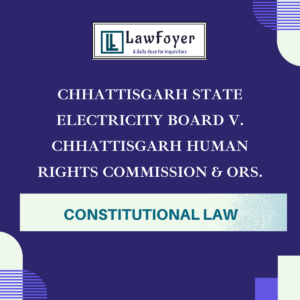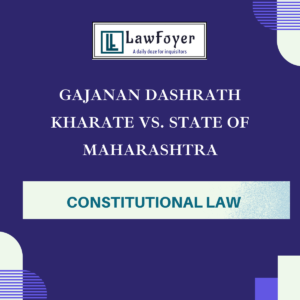A) ABSTRACT / HEADNOTE
The Supreme Court addressed the High Court’s exercise of suo motu contempt jurisdiction against Gulshan Bajwa, a practicing advocate and former army personnel, for repeated disobedience of court orders, threats against judges, and contemptuous actions. The appellant was sentenced to three months’ simple imprisonment and a fine, though the Supreme Court modified the sentence to imprisonment until the rising of the court due to his age and health. The judgment emphasized judicial independence, underscoring that the judiciary must be protected from defamatory attacks and that apologies lacking genuine remorse are unacceptable.
Keywords: Contempt of Court, Judicial Independence, Suo Motu Contempt, Criminal Contempt, Legal Misconduct
B) CASE DETAILS
- Judgement Cause Title: Gulshan Bajwa v. Registrar, High Court of Delhi & Anr.
- Case Number: Criminal Appeal No. 577 of 2007
- Judgement Date: January 30, 2024
- Court: Supreme Court of India
- Quorum: Justices Vikram Nath and Pamidighantam Sri Narasimha
- Author: Justice Vikram Nath
- Citation: [2024] 1 S.C.R. 1151 : 2024 INSC 74
- Legal Provisions Involved: Contempt of Courts Act, 1971
- Judgments Overruled by the Case: None indicated
- Case is Related to: Constitutional Law, Contempt of Court, Judicial Conduct
C) INTRODUCTION AND BACKGROUND OF JUDGEMENT
The present case arises from the actions of Gulshan Bajwa, who engaged in behaviors deemed to undermine judicial processes. Bajwa, known for previous disputes with judicial authorities, continued to display disruptive behavior through disobedience, threats, and accusations directed at the judiciary. This background context of repeated misconduct necessitated the Delhi High Court’s suo motu invocation of contempt jurisdiction. The High Court’s judgment aimed to protect the dignity of the court, eventually resulting in a conviction of Bajwa for criminal contempt. The Supreme Court reviewed this conviction and the appropriateness of Bajwa’s apology in the light of judicial principles, addressing the delicate balance between freedom of speech and the preservation of judicial authority.
D) FACTS OF THE CASE
The appellant, Gulshan Bajwa, sought adjournments and displayed unprofessional conduct towards opposing counsel, which escalated to the extent of him threatening judicial officers directly. Despite repeated warnings, Bajwa continued submitting unfounded and disrespectful allegations against High Court judges. Furthermore, he avoided court appearances, manipulated procedural filings, and attempted to reassign his cases to sympathetic benches, indicating forum shopping. Following numerous warnings and missed appearances, the High Court eventually issued bailable and later non-bailable warrants to secure his presence. Bajwa’s prolonged disregard for court directives and misconduct justified the High Court’s decision to initiate suo motu criminal contempt proceedings against him.
E) LEGAL ISSUES RAISED
- Whether Bajwa’s conduct amounted to criminal contempt under the Contempt of Courts Act, 1971.
- The extent to which the apology offered by Bajwa could serve to mitigate his contempt charges.
- The boundaries of judicial protection in cases involving deliberate acts to malign judicial officers.
F) PETITIONER/APPELLANT’S ARGUMENTS
- Improper Bench Assignment: The appellant argued for a bench reassignment, citing a perceived bias from the current bench due to previous interactions.
- Contempt Notice: Bajwa contested that no formal contempt notice had been served upon him, claiming his rights to due process were compromised.
- Nature of Threats: He characterized his comments to the opposing counsel as “elderly advice” rather than intentional threats.
- Irrelevance of Court Martial Proceedings: Bajwa contended that prior court-martial incidents were irrelevant to the contempt proceedings.
- Claim of Bias: Alleging a bias against him, Bajwa argued that the High Court’s actions stemmed from a prejudicial stance.
G) RESPONDENT’S ARGUMENTS
- Judicial Integrity: The respondents underscored the need to uphold judicial integrity, asserting that Bajwa’s actions struck at the heart of judicial dignity.
- Contempt Jurisdiction: They defended the High Court’s exercise of suo motu contempt jurisdiction as essential given Bajwa’s history of contemptuous acts.
- Unfounded Allegations: Respondents argued that Bajwa’s claims were spurious and aimed at avoiding judicial scrutiny rather than valid procedural concerns.
- Invalid Apology: They characterized Bajwa’s apology as insincere and incapable of mitigating his contemptuous actions.
H) RELATED LEGAL PROVISIONS
- Contempt of Courts Act, 1971: Key sections relevant to the contemptuous actions displayed by Bajwa.
- Judicial Independence Principles: Foundational principles asserting the judiciary’s immunity from baseless criticism.
I) JUDGEMENT
a. RATIO DECIDENDI
The Court upheld the High Court’s decision, establishing that Bajwa’s actions warranted conviction under the Contempt of Courts Act, 1971. The Court affirmed that malicious attempts to destabilize judicial authority or cast aspersions on judicial officers warrant strict punishment to maintain the judicial institution’s integrity. Bajwa’s disregard for decorum and his unsubstantiated accusations threatened judicial independence, justifying his conviction.
b. OBITER DICTA
The Court reiterated that apologies in contempt cases must be genuine and remorseful. Insincere apologies, such as Bajwa’s, serve only as a superficial attempt to evade accountability and therefore hold no weight in mitigating punishment.
c. GUIDELINES
- Apologies Must Show Genuine Remorse: The Court emphasized that only apologies which genuinely reflect contriteness can potentially mitigate contempt charges.
- Judicial Independence: The judiciary must be shielded from contemptuous actions that may impact public trust.
- Forum Shopping as Misconduct: Attempts to manipulate case assignments based on perceived biases or sympathies were firmly condemned.
J) CONCLUSION & COMMENTS
This case affirms that while advocates enjoy the freedom to contest and challenge, they must respect the boundaries of judicial conduct. The Supreme Court’s decision sends a strong message to maintain judicial decorum and penalize those who threaten this principle. By modifying Bajwa’s sentence to “imprisonment till the rising of the court” considering his health and age, the Court balanced the imposition of justice with compassionate grounds, establishing a nuanced precedent for contempt law application.
K) REFERENCES
a. Important Cases Referred
- M.B. Sanghi, Advocate v. High Court of Punjab & Haryana (1991) 3 SCC 600
- Pritam Pal v. High Court of M.P., Jabalpur (1993 Supp (1) SCC 529)
- Ajay Kumar Pandey, Advocate, In Re (1998) 7 SCC 248
- M.Y. Shareef v. Hon’ble Judges of High Court of Nagpur (1955) 1 SCR 757
- L. D. Jaikwal v. State of U.P. (1984) 3 SCC 405
b. Important Statutes Referred
- Contempt of Courts Act, 1971



